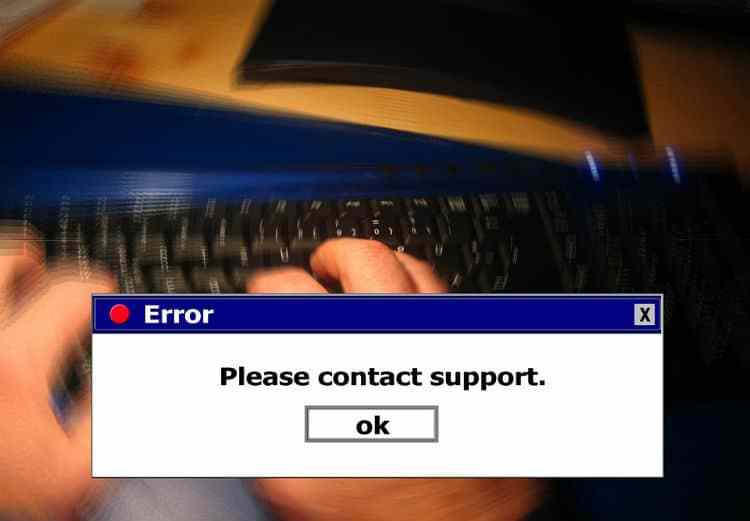



Revolutionized is reader-supported. When you buy through links on our site, we may earn an affiliate commision. Learn more here.
If you’ve ever worked with a computer before — and who hasn’t? — then you already know a relationship with them is tumultuous. When everything is in working order, the experience is great. But when there are technical difficulties, things can get frustrating and sometimes even overbearing. Even something that seems simple, like a freeze or hang-up, can indicate serious problems, which means fixing them can be trying. It makes sense, then, that an entire industry has arisen behind troubleshooting and technical support. But believe it or not, third-party help is often not necessary. A lot of the common computer problems you might run into can be fixed easily, by you.
Here are the top 15 most common computer problems that can really get under your skin! TLDR? Watch this video on the top 10 common computer problems if you’re running short on time!
The “Blue Screen of Death” is a Microsoft Windows-related STOP error. Usually, it indicates a serious problem, most likely hardware- or driver-related.
It’s often accompanied by an error code that you can reference to find out what happened. In fact, many places offer a list of these error codes for you to look up.
Another standard system issue — again, with Windows-based operating systems — is a DLL error. This means a DLL file is either missing or corrupt. Files ending with “.DLL” are dynamic link library files.
They hold many codes, procedures, and instructions for programs. They exist to tell the OS how to deal with certain apps. Several programs can also open them at once, improving memory conversion.
These are necessary system files, and when they’re missing or corrupt, bad things happen. This is unfortunate, and common because there are so many of them.
When applications slow down or hang, it could be due to any number of causes. But the most common relates to processing power and memory.
Computer memory — or random access memory — is used to store data temporarily while programs are running. The recommended amount for Windows users is 2GB or more, but a higher number is ideal. In fact, the more memory you have, the more programs you can run concurrently.
RAM doesn’t necessarily speed up a computer, but it can make applications and programs run better. So, yes, it’s commonly associated with performance and speed.
Malware is a type of software that can damage or disable computers and related systems. It has to be installed on a computer before it can cause problems. However, this can happen much more quickly than you think.
For example, just downloading a file from a website could result in malware on your computer. Once opened, it can damage files, and it can even slow down your computer by using up valuable resources.
Internet or network connectivity issues can stem from many problems. First, there could be something wrong with your ISP, or internet service provider. Then, there are DNS servers you must connect to, which can also encounter issues. Finally, there’s your local hardware, which includes your router, computer and network software.
Luckily, Windows has a troubleshooting tool that can help identify network connection issues.
A hard drive failure can lead to serious problems. The good news is that hard drives are easily replaceable. The bad news is that the data stored on said hard drive can become corrupt or lost forever.
This isn’t a big deal if you’re talking about program files that can be easily recovered. But when it comes to personal documents, photos, and important data it’s a huge problem. This is all data you can’t easily duplicate.
It’s recommended that you keep backups of your most important files. A hard drive can fail at any time, and it can happen with both old and new drives. Worse yet, failure rates differ depending on the type, capacity, and brand of a drive.
Translation: You never know when a hard drive failure will happen, so preparation is essential.
During a severe failure — usually related to hardware — a computer can freeze or lock up. But this can also happen due to software problems, too, so never rule it out.
Most of the time, you can remedy this by opening the Windows task manager and force-closing the problematic application. Other times, the computer will lock up completely, and the only way to fix it is to reboot the machine.
Computers are never silent. At any given time, multiple functions take place that can cause noise. Mechanical hard drives and optical disk drives, for instance, make a distinct noise when powering up and when they’re in use. Cooling fans can also make noise as they spin. Graphics cards or GPUS also have a fan that turns as they heat up.
Many of these components can make strange noises as they fail or begin to age.
As power flows through the parts inside a computer are used, they heat up. It’s natural. This includes the CPU, hard drives, graphics cards, the power supply, external and internal drives and even the motherboard.
Some of the components can operate fine under a little warmth. When the heat inside a computer grows too high, it can cause serious failures, and it can even damage components. That’s exactly why a processor has its own cooling fan. The same applies to a graphics card or power supply. These components need to stay within a reasonable temperature range.
You never want components to overheat.
There are many reasons why an application might not install on your computer. The most likely of which is that your computer and its software are not compatible with said application.
There are minimum system requirements to run everything from a simple program to a hardware-intensive game. If your computer does not meet these needs, you can experience a slowdown, and sometimes the app won’t even run.
Other issues that can prevent installation are hardware failures, storage space, and missing files. Missing files can also be system files like .DLLs and .NET framework content.
There’s nothing worse than your computer restarting in the middle of a video game or your work. In addition to having to wait for the computer to boot back up, you might lose any progress you’ve made in the meantime. Sudden reboots or shutdowns can have a number of different hardware or software causes. If you’re running a Windows operating system, an automatic Windows Update could be the culprit. These updates are supposed to warn you before they reboot but if you don’t see the notification, they could catch you unaware.
If you’re playing a new video game and the computer shuts off, it could be a problem with your power supply — specifically, it might not have enough power to keep the computer running under that load.
It’s hard to use your computer if your peripherals suddenly stop working or aren’t functioning correctly. Even if you know some of the keyboard shortcuts, most modern computers aren’t designed to be used without a mouse. This, again, could be hardware or software problems. The peripherals themselves could fail, preventing them from communicating with the computer. The USB ports can also fail, which interrupts the communication between the keyboard and mouse, and the computer.
On the software side, if the drivers fail the hardware might be working fine but the computer has no idea what to do with that information.
You can have 16 gigabytes of RAM on your computer, but if the computer isn’t set up correctly it might only be utilizing a fraction of that processing power. If you’re only using part of your computer’s RAM, your games and programs will run slower — or not at all.
RAM issues can have a lot of causes. If one or more of the RAM sticks isn’t seated correctly, it won’t function. If the computer is programmed to only use a fraction of the available of the ram, regardless of how many sticks you install.
If your computer starts to boot up before giving you an “Error Loading Operating System” message or just looping back through the restart process, you might start freaking out. Don’t panic. This computer problem can happen because of fresh operating system installation, or a problem caused by power failures, system crashes, or incorrect restarts. You’ll see this error because when your computer boots up, it starts the motherboard up first, then checks the hard drives, and if there isn’t an issue with those, it will boot up the computer. If there are any issues, you’ll get the error message, and have some troubleshooting to do.
The computer is on — at least, according to the lights on the case — but you’re not seeing any images on the monitor. This is another issue that could have a lot of different causes. The first thing you should check is your video cables that run between the monitor and the computer. If something has come loose, that would prevent your screens from working. Other issues might include graphics card failure, driver issues, or problems with the graphics ports on the computer.
Just knowing these common computer problems exist is not enough. You must also understand what to do when you encounter one of these setbacks.
For example, how do you remove malware once it’s on your computer? How do you prevent overheating, and if it happens, how do you cool your computer back down?
Read about more tech news topics here!
Revolutionized is reader-supported. When you buy through links on our site, we may earn an affiliate commision. Learn more here.


This site uses Akismet to reduce spam. Learn how your comment data is processed.